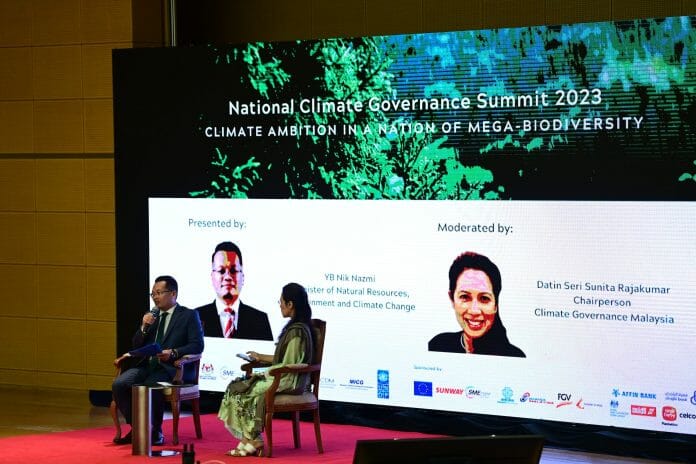Malaysia is recognised as one of the world’s 17 megadiverse countries due to its extraordinarily rich and diverse ecosystems. Its biodiversity — its fauna, rainforests, oceans, rivers, lakes and mountains — are national treasures that cannot be lost.
indeed, if we lose them, our entire nation will be lost, said Minister Of Natural Resources, Environment and Climate Change Nik Nazmi Nik Ahmad in his address of the National Climate Governance Summit 2023 today (Sept 5).
What Does Biodiversity matter
Held uder the theme ‘Climate Ambition in a Nation of Mega-Biodiversity Conversation,’ Nik Nazmi said Biodiversity, broadly, can be understood as encompassing a vast array of animals, plants, fungi, and microorganisms. In short, it is the lifeblood of our planet. Ecosystems, intricate networks where these organisms interact, are the foundation upon which life as we know it depends. Indeed, biodiversity plays a pivotal role in maintaining ecological balance, regulating temperatures, ensuring food security, and providing access to clean water.
“It also has an underestimated importance to our economy. The idea that we have to choose between economic development and protecting our environment is a manifestly false one. The World Economic Forum (WEF) has highlighted that over half of the world’s economic output is dependent on nature. Our economies rely on the “services” of the ecosystem, and its disruption due to biodiversity collapse can have severe economic repercussions.”
Consider, for instance, the role of tropical rainforests in regulating the climate. These forests serve as a carbon sink, absorbing vast amounts of atmospheric carbon dioxide. Simultaneously, they release oxygen into the atmosphere, supporting all life forms, including human beings.
However, according to the Global Assessment Report of Biodiversity and Ecosystem Services issued by the Intergovernmental Science-Policy Platform on Biodiversity and Ecosystem Services (IPBES) in 2019, the fifth edition of the Global Biodiversity Outlook, and many other scientific documents, the past few decades have seen an alarming decline in biodiversity worldwide, largely due to human activities. We’ve witnessed species extinction rates accelerate at an unprecedented pace, threatening the stability of ecosystems.
Biodiversity and climate change intrinsically linked
This biodiversity crisis is not isolated; it is intrinsically linked to climate change. As temperatures rise and extreme weather events become more frequent, biodiversity loss exacerbates the negative impacts of climate change, creating a vicious cycle.
Malaysia has not been insulated. Our nation has suffered habitat loss, poaching, illegal wildlife trade, and invasive species. These threats endanger our unique and diverse flora and fauna.
“I recently had the privilege to visit the Tasik Temenggor within the Royal Belum State Park as part of Global Tiger Day. The thought that these magnificent creatures—who are depicted on our national coat of arms—could one day disappear from the face of the earth should fill any sensible person with alarm. As such, the work of His Royal Highness the Regent of Pahang in the “Save the Malayan Tiger Campaign” is truly inspirational and should be supported by all,” he said.
The consequences of unchecked climate change would be dire for the entire planet. Indeed, it has been estimated by the United Nations High Commission For Refugees (UNHCR) that an annual average of 21.5 million people were forcibly displaced each year since 2008. The Institute of Economics and Peace (IEP) has also warned that some 1.2 billion people could be displaced globally by 2050 due to climate change.
As such, protecting biodiversity, at home and abroad is not an ideological project or scientific abstraction. It is a political, economic and social imperative that nations ignore to their peril.
Malaysia’s Biodiversity Record
Malaysia has not been idle in these weighty issues. It boasts rich biodiversity, but this wealth also brings significant responsibilities. In 1992, at the UN Conference on Environment and Development, which was also known as the Earth Summit, our country pledged to maintain a minimum of 50% forest and tree cover, provided that developed nations maintain at least 30% of their land as forest cover, a promise we have kept with 54.6% forest cover today. This foresighted commitment has positioned Malaysia among the 25 developing countries with high forest cover and low deforestation rates.
“Our approach to preserving biodiversity is holistic and forward-thinking. We have adopted pragmatic, progressive, and long-term development strategies that recognize the intrinsic value of our natural heritage. Key among these strategies is the alignment with the Kunming-Montreal Global Biodiversity Framework (KMGBF), an international commitment aimed at reversing the decline in biodiversity. This framework, adopted during the 15th CBD COP15 in 2022, emphasizes ambitious goals and global collaborative action.”
This includes the protection and restoration of at least 20% of the world’s lands and 10% of marine areas by 2030. The revision of Malaysia’s National Biodiversity Strategies and Action Plans (NBSAPs) to align with the KMGBF is a significant step forward. Our participation and support for these targets in international negotiations, such as COP15, reflect the nation’s commitment to global biodiversity conservation.
The allocation of ecological fiscal transfer (EFT) for Biodiversity Conservation to encourage states to better protect their forests has also been increased from RM70 million in 2022 to RM150 million in 2023. These are given conditionally, depending on the state’s efforts to conserve existing protected areas and the gazettement of new protected areas. We have likewise been forging close ties with state governments to ensure development activities can be balanced with environmental conservation, including better coordination between the State Excos Responsible for the Environment.
“We have recognised the important roles of non-governmental actors, notably indigenous peoples and local communities, in biodiversity conservation. The employment of community rangers under the Biodiversity Protection and Patrolling Programme (BP3), which began in Peninsula Malaysia in 2019, has been expanded to Sabah and Sarawak this year.”
However, as a megadiverse country, Malaysia always seeks to take a more proactive role. Indeed, our goal is to emerge as a “biodiversity superpower” among nations with such rich ecosystems. Malaysia’s commitment to the KMGBF should go beyond support and extend to leadership. This entails not only meeting targets but also setting an example for other nations to follow.
The financial aspect of biodiversity conservation must also be addressed. The KMGBF calls for at least USD200 billion per year, with a significant portion coming from wealthy to low-income countries. Malaysia intends, at international forums like the COP28, to advocate for equitable contributions, recognizing the shared responsibility of nations in preserving biodiversity.
“I think it is worth noting, for those who are unaware, that the COP28 in Dubai, the United Arab Emirates will be graced by His Majesty the Yang Di-Pertuan Agong. Also, our Malaysian delegation will be led by YAB Prime Minister Dato’ Seri Anwar Ibrahim. Again, this is proof that when it comes to sustainability, Malaysia’s leaders lead from the front.”
The Road Ahead
More can always be done. “For instance, we can never have too much public awareness and understanding of the importance of biodiversity. Conservation efforts can only succeed if citizens are informed and engaged,” the minister said, adding, Malaysia’s strong conservation laws must be enforced consistently. While the nation has made strides in policy development, ensuring these laws are implemented in a nation with diverse ecosystems and interests can be complex. This is where a more robust and integrated biodiversity legal framework is needed.
Strengthening this must be a priority. This includes enforcing newly passed legislation such as the Wildlife Conservation (Amendment) Act 2022 and the National Forestry (Amendment) Act 2022 that empowers authorities to protect vital habitats and species in Peninsular Malaysia. Furthermore, the National Biodiversity Council (MBN) should continue to emphasise a whole-nation approach to biodiversity management.
Besides this, several possible policy initiatives include:
a. Enhanced Conservation Education: That is to say, investing in comprehensive conservation education programs not only for schools and universities but also for the general public.
b. Strengthen Legal Frameworks: We must ensure the strict enforcement of conservation laws and consider stronger penalties for wildlife-related crimes as a deterrent.
c. Research and Data Sharing: We must encourage scientific research and data sharing related to biodiversity. We must collaborate with local and international institutions to gain a deeper understanding of Malaysia’s unique ecosystems.
d. Support Indigenous Communities: We ought to be providing more support and recognition for the role of indigenous communities in conservation. I recently had the privilege to speak at the 12th Orang Asli Land Conference and hearing from these communities was a moving experience. Their traditional knowledge can be harnessed to preserve and protect our nation’s biodiversity.
The Belum-Temenggor landscape stands as a shining example of successful conservation efforts that integrate indigenous communities. Traditional knowledge passed down through generations enriches biodiversity conservation strategies, reinforcing the interconnectedness between human communities and nature. In many ways, the indigenous communities are our nation’s conscience when it comes to environmental conservation and stewardship of the land.
Nik Nazmi stressed: “We cannot do it without them, and we owe it to them.”
e. Climate Adaptation Strategies: We must develop climate adaptation strategies to safeguard biodiversity from the impacts of climate change. This includes restoring and protecting habitats that act as climate refuges. The strategic formulation of the National Adaptation Plan is also taking place to increase our resilience and readiness in facing the impact of climate change.
f. Invest in Green Technologies: We also need to encourage investments in green technologies and industries that are sustainable and eco-friendly. This can create economic opportunities while minimising harm to the environment.
g. International Cooperation: Malaysia must also collaborate with international organizations and neighbouring countries to address transboundary conservation issues and participate in global efforts to combat climate change. Developing nations in Southeast Asia, including Malaysia, provide enormous carbon sinks. While we have a responsibility to protect them, our aspirations for economic development must also be met, and the developed nations must support both imperatives.










